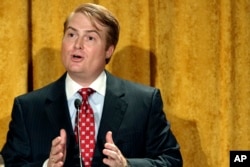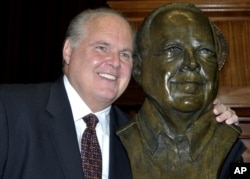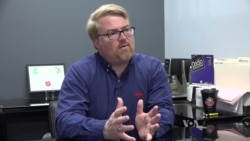Donald Trump’s rally numbers are up for debate.
It’s a quiet Sunday morning in the small city of Carlisle, Pennsylvania. Inside a sound booth in a storefront radio station, "The Marc Scaringi Show" is taking calls from Trump supporters, who are reporting that the Republican front-runner had far more supporters at his latest rally than the mainstream media reported.
“Why do you think the press is constantly distorting the numbers like that?” asks one female caller.
Scaringi leans in to the mic. “They’re probably trying to downplay the overwhelming popular support Donald Trump has,” he says.
Scaringi worked on Capitol Hill for years and ran for a U.S. Senate seat as a tea party candidate in 2012. Now the Harrisburg, Pennsylvania, lawyer hosts a weekly talk show that, in the words of his show opening, aims to “celebrate constitutional conservatism.”
Across the country, hundreds of local conservative talk radio hosts like Scaringi are tapping into the electorate’s outsider sentiment this election season, contributing to the unexpected fall of former establishment presidential candidates Jeb Bush and Marco Rubio and the rise of Republican front-runner Donald Trump and Texas Senator Ted Cruz.
Scaringi says the radio show has been a learning experience since the station approached him and suggested that he host a show last October. He admits he cuts across the grain of the modern Republican Party on many issues. His change from tea party candidate to Trump supporter makes more sense when you consider the businessman’s “America First” approach to trade, immigration and foreign policy.
Scaringi has adopted a similar approach: “I will try to turn it back to the Constitution and I will try to answer those debates and dilemmas by how our Founding Fathers considered and deliberated and decided those issues."
Scaringi says the callers on his show can’t stop talking about Trump and the way he speaks about the issues that matter the most to them — immigration, terrorism and trade.
Radio's children
Trump and Cruz are “both the spawns of talk radio,” Brian Rosenwald says of the two remaining leading candidates in the Republican presidential field. Rosenwald is a fellow at the University of Pennsylvania and is writing a book about the impact of conservative talk radio.
Rosenwald says Cruz is the “ideological child of talk radio,” an uncompromising conservative whom hosts have been “pleading for for decades,” while Trump mimics the style of talk radio with his “unvarnished, unfiltered, almost hyperbolic style full of insults and wisecracks.”
Longtime talk show host Rush Limbaugh is still the leader in the field, with an average of 14 million to 16 million listeners a week, followed by other enormously popular hosts like Glenn Beck and Laura Ingraham who can pull in millions of listeners in a week. But the larger impact, Rosenwald says, is in smaller markets like Carlisle, where “the local hosts could have a much larger audience in terms of politically engaged folks.”
Successful hosts build relationships with their listeners, treating them as friends and conversational partners in a way a news anchor or newspaper reporter simply can’t.
“One of the appeals of the medium is that the talk radio host can say what the average Joes are thinking but feel they can’t say,” says Rosenwald, “because they’re going to be branded as a bigot or scorned in some way.”
Building a conversation
Days after the Trump rally debate on Scaringi's show, Mark Zimmerman sits at a coffee shop a block away from the state Capitol, reflecting on the crowd that gathered for Trump and the way the 2016 election has become an inflection point for changes in technology, media and politics.
A self-described Trump supporter who attended the rally, Zimmerman says he listens to the Scaringi show because it reveals the institutional interests behind the Republican and Democratic presidential candidates.
“Marc’s onto that; he keeps hammering away at that,” says Zimmerman. He says the political process in Washington has moved too far away from the average person and the “more it’s suppressed, the more volatile it will become.”
Zimmerman says talk radio programs provide an outlet by approaching issues with a logical analysis.
Scaringi “does have an open mind, and he is listening to what people are saying,” he says. “He has callers on his shows and they’re angry. I witnessed that for the first time at the Trump rally. These people are angry. They don’t feel like their voices are being heard.”
Zimmerman listens to nationwide political talk shows and reads The Economist, but he says local talk radio allows listeners to decide how they perceive issues. “There’s a very different conversation happening here locally. I think you’re hearing it on shows like Marc’s.”
WATCH: Electing Pennsylvania Republican 'Deal-Makers' Exposes Party Divides
Ultimate impact
And talk radio's finest hour could still be ahead.
“If the establishment tries to pick a nominee who is not Ted Cruz or Donald Trump in July in Cleveland,” says Rosenwald, “talk radio is absolutely going to explode.”
Scaringi will be there. He was elected as a delegate to the Republican Party convention in Cleveland this summer and will vote for Trump no matter how many rounds it takes to settle the nominating process.
“If we go to a second ballot, who knows what’s going to happen?” Scaringi says. He predicts the convention will be contentious because the establishment powers are using Cruz to deny Trump the nomination. “The men and women who control a lot of these party apparatuses and the Republican national party are going to push Kasich."
And the outsider talk show host will be bringing the convention and all its messiness back to his listeners in Carlisle.








